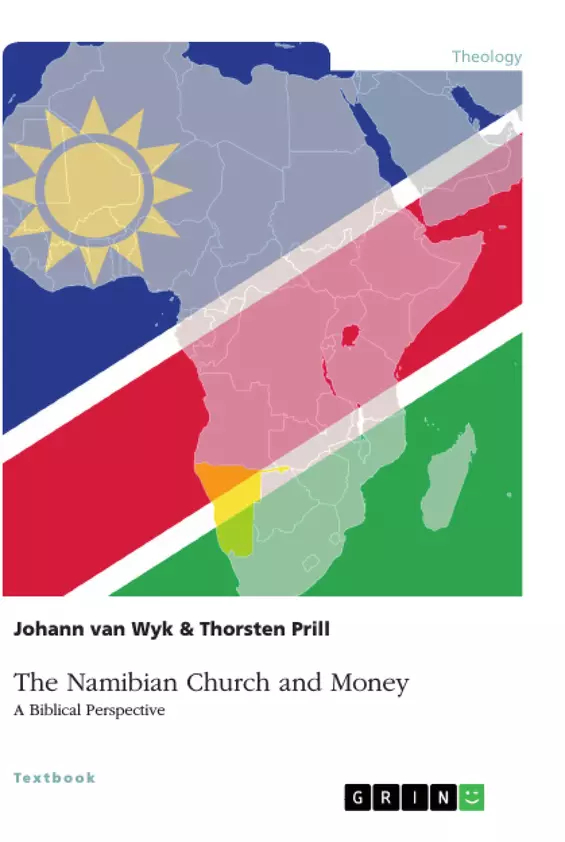Money can be a hot topic in Christian churches and the Namibian church is no exception to that. While many traditional mainline denominations struggle to raise the funds they need for their various ministries, prosperity type churches and Pentecostal church bodies seem to flourish financially in Namibia. Some people are quick to point out that the main reason for this phenomenon lies in the churches’ differing attitude towards the concept of tithing. While tithing plays a central role in Pentecostal and prosperity churches, most Protestant denominations rely on other ways of funding.
In his paper, Thorsten Prill gives a critical overview of the various methods Namibian churches use to raise funds. These methods include collections, membership fees, fundraising events, commercial activities and investment trusts as well as encouraging members to give a tenth of the income to the church.
In a second paper, Johann van Wyk examines the concept of tithing from a biblical perspective. He demonstrates that New Testament teachings do not support the claim that Christians are obliged to tithe. There are, however, a number of helpful biblical principles of giving which Namibian churches should apply. Most importantly, van Wyk argues, that giving in Namibian churches needs to become a matter of the heart; giving must be driven by love and grace.
Inhaltsverzeichnis (Table of Contents)
- Namibian Churches and Funding: A Critical Introduction (Thorsten Prill)
- To Tithe or Not to Tithe? Biblical Principles of Giving for the Namibian Church (Johann van Wyk)
Zielsetzung und Themenschwerpunkte (Objectives and Key Themes)
This book examines the relationship between the Namibian Church and money, specifically focusing on funding practices and biblical perspectives on giving. It aims to provide a critical analysis of various funding methods employed by Namibian churches and explore the concept of tithing from a biblical standpoint.
- Funding Practices in Namibian Churches
- Biblical Perspectives on Giving
- The Concept of Tithing
- The Importance of Giving from the Heart
- The Role of Grace and Love in Giving
Zusammenfassung der Kapitel (Chapter Summaries)
- Namibian Churches and Funding: A Critical Introduction (Thorsten Prill): This chapter provides an overview of the different funding methods used by Namibian churches. It examines various approaches, including collections, membership fees, fundraising events, commercial activities, investment trusts, and the practice of tithing.
- To Tithe or Not to Tithe? Biblical Principles of Giving for the Namibian Church (Johann van Wyk): This chapter delves into the biblical principles of giving, exploring the concept of tithing and its relevance to contemporary Namibian churches. It argues that New Testament teachings do not mandate tithing but emphasize the importance of giving driven by love and grace.
Schlüsselwörter (Keywords)
This book focuses on the following key areas: Namibian churches, funding practices, tithing, biblical principles of giving, love, grace, and the importance of giving from the heart.
Frequently Asked Questions
How do funding practices differ between Namibian churches?
Mainline denominations often struggle with traditional methods like membership fees, while Pentecostal and prosperity churches flourish through a central focus on tithing.
Does the New Testament mandate tithing?
According to the analysis by Johann van Wyk, New Testament teachings do not support a mandatory obligation for Christians to tithe, but rather emphasize giving from the heart.
What are common fundraising methods used in Namibia?
Churches use various methods including collections, membership fees, fundraising events, commercial activities, and investment trusts.
What is the "Prosperity Gospel" context in Namibia?
Prosperity churches link financial giving to spiritual and material blessings, which has a significant impact on their financial success compared to traditional churches.
What are the recommended principles for Christian giving?
The book argues that giving should be driven by love, grace, and a sincere heart rather than legalistic obligation.
- Citar trabajo
- Dr. Thorsten Prill (Autor), Johann van Wyk (Autor), 2020, The Namibian Church and Money, Múnich, GRIN Verlag, https://www.grin.com/document/704282



